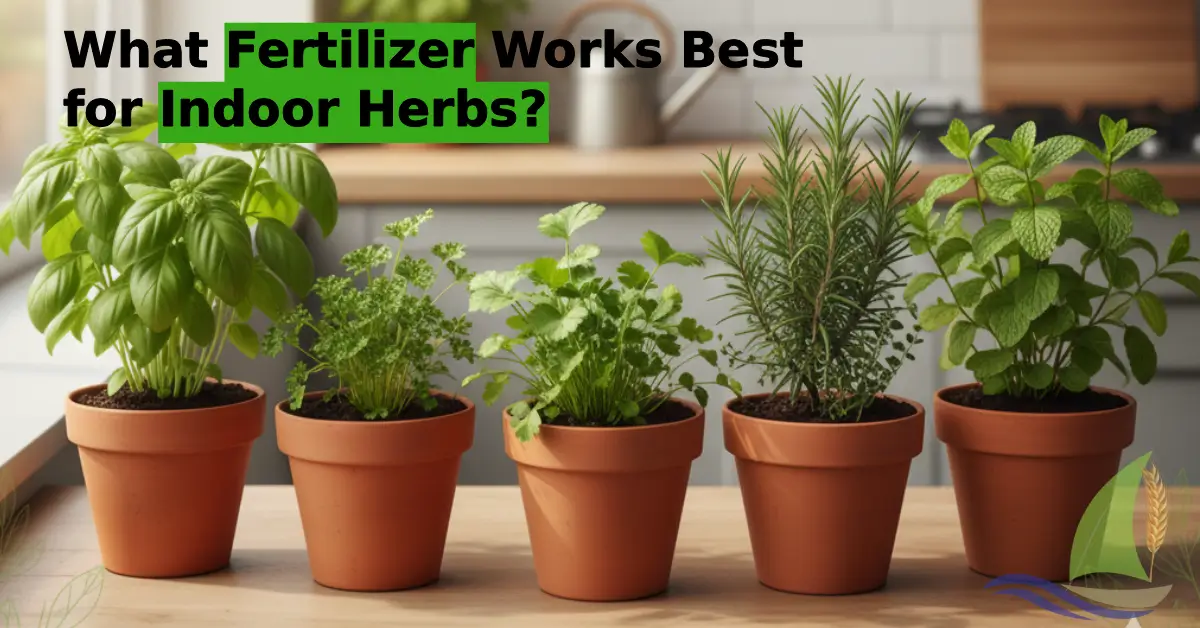Growing herbs indoors is a rewarding way to enjoy fresh flavors year-round, but success depends on more than just sunlight and water. Indoor herbs thrive when given the right nutrients, and that’s where choosing the best indoor plant fertilizer becomes crucial. Herbs like basil, parsley, mint, and thyme have specific nutrient needs that change as they grow, and understanding these requirements will help you cultivate healthy, aromatic, and productive plants.
This comprehensive guide explores the best fertilizer options for indoor herbs, how often to feed them, organic alternatives, growth stage considerations, and signs your herbs may need nutrient adjustments. Along the way, we’ll also look at specialized solutions, including YaraFert products such as Sulfomix, Biofast, and Ugarit blends, designed to meet the needs of edible indoor plants.
Ideal Indoor Plant Fertilizer for Common Kitchen Herbs
Indoor herbs require a balance of nitrogen (N), phosphorus (P), and potassium (K)—often referred to as the NPK ratio—plus trace minerals like iron, magnesium, and zinc. Each nutrient plays a distinct role:
- Nitrogen (N): Stimulates leafy growth in herbs like basil and parsley.
- Phosphorus (P): Supports root development, essential for oregano and thyme.
- Potassium (K): Enhances flavor concentration and disease resistance in mint, cilantro, and rosemary.
- Micronutrients (Fe, Zn, Mn, Mg, B): Improve chlorophyll formation, aroma, and overall vitality.
For a well-rounded indoor plant fertilizer, balanced blends like Ugarit 27-27-27 + TE or Biofast Gel provide consistent nutrition, ensuring herbs remain vigorous and aromatic. Additionally:
- Leafy herbs (basil, parsley, cilantro): Perform well with higher nitrogen ratios like Ugarit 40-10-10 + TE.
- Woody herbs (rosemary, thyme, sage): Prefer lower nitrogen and higher potassium, making Ugarit 10-10-40 + TE or Ugarit Multi excellent options.
Using a targeted indoor plant fertilizer means your herbs won’t just survive indoors—they’ll thrive with intense aroma and robust growth.
How Often to Use Indoor Plant Fertilizer on Herbs
Herbs need consistent but moderate feeding. Over-fertilizing can lead to excessive foliage with weak flavor, while under-fertilizing results in pale, stunted plants.
A practical fertilization schedule includes:
- Every 2 weeks during active growth (spring and summer).
- Once per month during slower growth periods (fall and winter).
- Diluted strength (half recommended dose). Indoor plants require less fertilizer than outdoor counterparts.
For example:
- A liquid fertilizer like Ugarit K-T-S 25 (36% K?O, 25% SO?) can be applied biweekly for potassium-loving herbs.
- Suspension formulas such as Sulfomix (rich in Fe, Zn, Mg, Mn, and S) are effective monthly supplements to correct micronutrient deficiencies.
Rule of thumb: “Light but regular feeding keeps indoor herbs balanced without overwhelming them.
READ MORE: Eco-Friendly Indoor Plant Fertilizers You Should Try
Organic Indoor Plant Fertilizer Options for Edible Herbs

If you prefer organic solutions, there are natural fertilizers that improve soil health while nourishing herbs. Organic fertilizers release nutrients slowly and encourage microbial activity, which benefits long-term plant health.
Common organic indoor plant fertilizer options include:
- Compost tea: Provides a mild, nutrient-rich boost.
- Fish emulsion: High in nitrogen, ideal for leafy herbs.
- Seaweed extract: Supplies potassium and trace minerals.
- Humic and fulvic acids: Enhance nutrient uptake and root activity.
Among professional-grade products, Ugarit 10-0-5 + 70% Organic Matter is an excellent choice, as it combines nitrogen and potassium with humic (27%) and fulvic acids (43%), improving both soil structure and nutrient absorption. Similarly, SULPHOMIN (45% N, 15% SO?, 25% organic matter) supports sustained, eco-friendly herb nutrition.
Organic fertilizers are especially valuable for edible herbs, ensuring safe and flavorful harvests without synthetic residues.
Herb Growth Stages and Indoor Plant Fertilizer Needs
Herbs go through different nutrient demands as they mature. Tailoring your indoor plant fertilizer to each stage maximizes yield and flavor.
Germination and Seedling Stage
- Nutrient focus: Phosphorus and calcium for root development.
- Recommended fertilizer: Ugarit 0-52-34 (52% P?O?, 34% K?O) ensures strong early root systems.
Vegetative Growth Stage
- Nutrient focus: High nitrogen for lush green leaves.
- Recommended fertilizer: Biofast (12-12-12 + humic/fulvic acids) encourages dense foliage.
Pre-Harvest and Mature Stage
- Nutrient focus: More potassium for flavor intensity and resilience.
- Recommended fertilizer: Ugarit K-T-S 70 (36% K?O, 70% SO?) boosts aroma and essential oil production.
Continuous Harvest Stage
- Nutrient focus: Balanced nutrition with micronutrients to sustain regrowth.
- Recommended fertilizer: Sulfomix or Ugarit Beet (Zn, Cu, Mo, Mg, B) maintain long-term vitality.
By synchronizing fertilizer type with growth stage, you ensure herbs produce consistently flavorful leaves.
Signs Your Herbs Need Indoor Plant Fertilizer Adjustments

Even with a regular feeding schedule, herbs can show signs that adjustments are needed. Monitoring plant health helps you respond quickly.
Look out for these indicators:
- Yellowing leaves: Possible nitrogen deficiency—consider Ugarit 40-10-10 + TE.
- Weak aroma or poor flavor: Low potassium—apply Ugarit Multi or Ugarit 0-5-65.
- Slow growth or weak stems: Phosphorus deficiency—use Phosphoric Acid 85% w/v for a rapid correction.
- Interveinal chlorosis (yellow between veins): Magnesium or iron deficiency—correct with Calcimag or Sulfomix.
- Leaf curl or deformities: Micronutrient imbalance—restore with balanced blends like Ugarit 25-25-25 + TE.
A responsive approach ensures your herbs receive the precise indoor plant fertilizer needed for lush, aromatic growth.
Conclusion: Choosing the Right Indoor Plant Fertilizer for Herbs
Selecting the best indoor plant fertilizer for herbs depends on their type, growth stage, and specific nutritional needs. Balanced NPK formulas, organic options, and micronutrient-rich blends all play a role in keeping indoor herbs healthy and flavorful.
Professional solutions like YaraFert products—Sulfomix, Biofast, and Ugarit fertilizers— offer versatile options tailored to different herbs and growth phases. Whether you prioritize organic matter, balanced nutrition, or micronutrient corrections, these products ensure reliable results for edible indoor plants.
Ready to take your indoor herb garden to the next level? Explore our full range of YaraFert solutions designed for safe, effective herb cultivation. Contact our team today for expert recommendations and discover which indoor plant fertilizer will help your herbs thrive year-round.
READ MORE: Top 5 Natural Fertilizers Safe for Pets and Indoor Use

